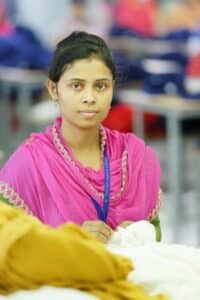Industry Update/National Response
- February 2022: The government has lifted COVID-19 restrictions from 22 February. However, people will have to continue wearing masks outdoor. Factories are operating following health and safety guidelines. Better Work will resume its in-person advisory, assessment and training services from 1 March.
- January 2022: Bangladesh has reported a sharp rise in COVID-19 infections amid fears of omicron variant spreading throughout the country. Factories are operating following health and safety guidelines. Better Work suspended its in-person factory services from 24 January until 28 February.
- November 2021: All offices, factories, shops and public transport services are operating in line with health and safety guidelines. Both COVID-19 cases and deaths significantly dropped in Bangladesh as mass vaccination continues. Better Work staff resumed in-person advisory services on a limited scale.
- August 2021: The government has lifted most of the restrictions from 11 August as part of its efforts to phase out the lockdown. All offices, factories, shops and public transport services will reopen following health and safety guidelines. Although mass vaccination campaigns continue across the country, the number of new COVID-19 infections is still high. Better Work staff continue to refrain from in-person factory visits.
- July 2021: The government has eased lockdown restrictions to allow people to celebrate the Eid-ul-Azha (July 21), despite record numbers of new coronavirus cases and deaths. From July 23, all industries, including apparel factories, which remained out of the purview of lockdown earlier. A vaccination programme has been rolled out for RMG workers on July 18. All workers will be vaccinated under this inoculation programme, which does not require any registration. Factories were asked to provide the list of workers for vaccination.
- June 2021: In late June, Dhaka imposed a citywide lockdown after cases COVID-19 cases have surged. Crowds flocked to disembarking ferries to leave the city in anticipation of a strict weeklong lockdown. All Better Work staff continue to refrain from in-person factory visits.
- May 2021: The government has extended the ongoing coronavirus lockdown to prevent further transmission of the disease in the wake of Eid celebrations. Public transport continues to operate within cities, but long-haul passenger transport services are on hold to stop the outbreak from spreading to rural areas. However, an exodus of people from cities to rural areas for Eid celebrations has stoked fears of a spike in coronavirus cases. All industries and factories are allowed to continue their operation following health guidelines. Shopping malls and stores are open until 9 pm. The Government resumed international commercial flights to and from a selected group of countries, with certain strict rules in place.
Factory Service Update
- July 2021: Better Work released guidance including the COVID-19 Management Guidance document, HR Guidelines and the Transitions and Retrenchments Guidelines to help factories reduce the risk of coronavirus and take practical measures to navigate the disruptions caused by the crisis.
- Better Work Bangladesh’s in-person factory services are temporarily on hold, but all the services are being delivered virtually.
- May 2021: In-person advisory visits have been replaced by tailored virtual advisory through video conferencing. Virtual visits include working with management and worker representatives. A total of 1,688Virtual Advisory sessions were conducted through May 2021.
- A total of 123 Virtual Compliance check sessions were conducted (September 2020 – March 2021) to replace physical Assessments.
- BWB’ COVID-19 Resource Hub offers useful guidelines, awareness materials and free training courses.
Additional Better Work Activities
- Under the Learning Hub initiative, some 192 Master Trainers from BKMEA, BGMEA, Employee Associations (IBC/NCCWE), WRC (Workers Resource Centre), and Department of Labour engaged over 9000 worker and management representatives in 500 factories (beyond BWB partner factories) until April 2021 to support factories respond to the traditional and COVID-19 crisis more efficiently.
- Better Work Bangladesh (BWB) has partnered with the Vision Zero Fund (VZF), situated within LABADMIN/OSH Department of the ILO, to provide Occupational Safety and Health (OSH) support to RMG factories in Bangladesh in response to the COVID-19 pandemic.
- Webinars are being organized with the buyer partners every month to discuss COVID-19 response strategies and priorities, and share enterprise-level updates.
- The ILO joined a task force together with other UN agencies and BGMEA and interested buyers to support the production of medical grade PPE equipment in the country, both as a response to the immediate Covid-19 crisis and as a future investment in higher-level PPE production capacity in the long-term.
